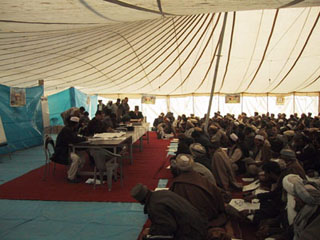
Participation in government is a core component of the civil society. In this photo, voter registration and elections are conducted in the Kabul province of Afghanistan to select the 46 delegates to the Afghan Constitutional Loya Jirga. (Photo courtesy of USAID.)
Instructor(s)
Prof. Lily L. Tsai
MIT Course Number
17.955
As Taught In
Fall 2004
Level
Graduate
Course Description
Course Description
In recent years both scholars and policymakers have expressed a remarkable amount of interest in the concepts of social capital and civil society. A growing body of research suggests that the social networks, community norms, and associational activities signified by these concepts can have important effects on social welfare, political stability, economic development, and governmental performance. This discussion based course examines the roles played by these networks, norms, and organizations in outcomes ranging from local public goods provision and the performance of democracies to ethnic conflict and funding for terrorism.


